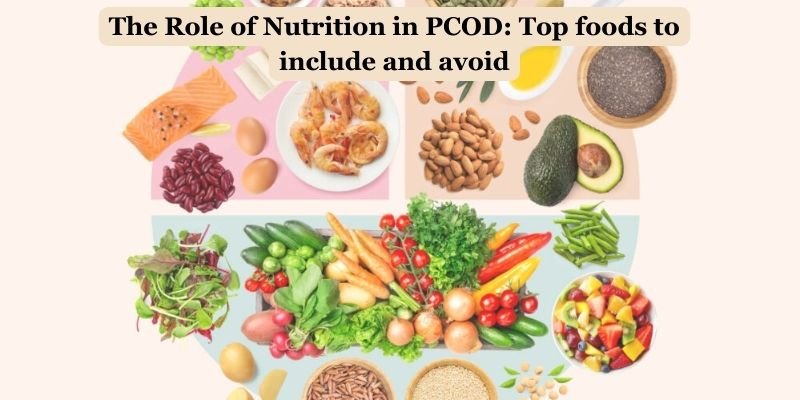
The hormonal condition called PCOD or polycystic ovary syndrome, affects women who are of reproductive age. It is characterized by the development of several tiny cysts in the ovaries, which can interfere with normal ovulation. In particular, an overabundance of androgens (male hormones) in the body is linked to PCOD.
Including Fiber-Rich Food in your diet can be beneficial for PCOD
Promotes Weight Management: Due to insulin resistance, a lot of women with PCOD have trouble controlling their weight. Fruits, vegetables, whole grains, legumes, and other fiber-rich meals make you feel satisfied for longer because they have a high satiety factor. This can support weight-management attempts by reducing overeating.
Helps Regulate Blood Sugar Levels: Fiber slows down the breakdown and absorption of carbohydrates, reducing the likelihood of sharp rises in blood sugar. Being insulin resistant, which can result in high blood sugar levels, is particularly critical for PCOD-afflicted women. Foods high in fiber can help regulate blood sugar levels and increase insulin sensitivity.
Supports Hormonal Balance: PCOD is linked to hormonal dysregulation, such as increased androgen levels. By fostering better gut health and assisting in the clearance of extra hormones through bowel movements, high-fiber diets can help regulate hormones. By doing so, you may be able to lower androgen levels and ease some PCOD symptoms.
Enhances Digestive Health: Maintaining a healthy digestive system requires fiber. This prevents constipation and encourages regular bowel movements by giving the stool more volume. Overall well-being can be enhanced by having a healthy gut, which may also indirectly help with PCOD symptoms.
Reduces Inflammation: Women with PCOD frequently have chronic inflammation, which can increase the risk of developing insulin resistance and other metabolic problems. Inflammation in the body can be decreased by fiber-rich diets, especially those high in soluble fiber, which have anti-inflammatory characteristics.
Including lean protein in your diet can be beneficial for PCOD
Supports Weight Management: Protein is known to boost fullness and aid in appetite control, which might be beneficial for PCOD-afflicted women who frequently battle with weight management. Lean protein sources, such as skinless poultry, fish, tofu, lentils, and low-fat dairy products, might support your efforts to lose weight or maintain your current weight by making you feel full for longer.
Regulates Blood Sugar Levels: Comparatively speaking to carbohydrates, protein has little effect on blood sugar levels. Lean protein can support better insulin management and aid to stabilize blood sugar levels at meals and during snacks. This is crucial for treating insulin resistance, and atypical PCOD features.
Supports Muscle Health: Maintaining and gaining lean muscle mass depends on consuming lean protein. Women with PCOD may benefit from strength training and regular exercise, and getting enough protein helps muscles recover and expand. Your metabolic rate may help with weight management and insulin sensitivity if you have increased muscle mass.
Enhances Hormonal Balance: Lean protein sources can support hormonal balance in PCOD. The synthesis and control of hormones in the body depend on protein. It offers the essential amino acids needed to produce the hormones and enzymes necessary for a variety of physiological activities.
Including Anti-Inflammatory Foods in your diet can be beneficial for PCOD
Reduces Inflammation: Chronic low-grade inflammation, which can lead to insulin resistance and hormonal abnormalities, is linked to PCOD. Consuming anti-inflammatory foods can help the body experience less inflammation. Fatty fish (like salmon), leafy green vegetables, berries, turmeric, ginger, olive oil, and almonds are a few examples of anti-inflammatory foods.
Supports Insulin Sensitivity: Insulin resistance, in which the body's cells lose their receptivity to insulin, is a prevalent aspect of PCOD. Insulin resistance may worsen as a result of ongoing inflammation. Anti-inflammatory foods can lessen inflammation, such as those high in fiber, antioxidants, and omega-3 fatty acids (found in berries and green leafy vegetables), as well as omega-6 fatty acids (found in walnuts and fatty fish).
Balances Hormones: Hormonal dysregulation, such as increased androgen (male hormone) levels, characterize PCOD. Phytoestrogens, which are found in some anti-inflammatory foods including flaxseeds, chia seeds, and soy-based products, may aid in regulating hormone levels in the body.
Supports Weight Management: Weight management is a challenge for many PCOD sufferers. Weight gain and problems reducing weight can both be attributed to chronic inflammation. Through the reduction of inflammation and the promotion of a healthy metabolism, including anti-inflammatory foods can improve weight management efforts.
Improves Overall Health: Including anti-inflammatory foods in your diet can benefit your health in ways that go beyond just managing PCOD. Cardiovascular disease, type 2 diabetes, and certain malignancies are just a few of the illnesses that chronic inflammation is linked to. Anti-inflammatory diets can improve general health and lower the risk of certain diseases.
Some examples of anti-inflammatory foods:
Turmeric: Used in many Indian recipes, turmeric is renowned for its potent anti-inflammatory qualities. It includes a substance called curcumin, which has been demonstrated to lessen inflammatory responses in the body.

Ginger: Ginger is an antioxidant and an anti-inflammatory. It can be added to teas, curries, and many other Indian dishes.
Garlic: Garlic has anti-inflammatory properties due to its chemical composition. Chutneys, stir-fries, and curries can all use it.
Leafy greens: Anti-inflammatory and high in antioxidants are green leafy vegetables like spinach, kale, and fenugreek leaves. They can be steamed as a side dish, saut?ed in curries, or added to salads.
Berries: Strawberries, blueberries, and raspberries are among the berries that are high in antioxidants and have anti-inflammatory properties. They can be eaten as a snack or included in desserts, yogurt, and smoothies.
Nuts and seeds: Rich in omega-3 fatty acids and anti-inflammatory characteristics are almonds, walnuts, flaxseeds, and chia seeds. They can be eaten as snacks or added to Indian recipes.
Including Antioxidant-Rich Foods in your diet can be beneficial for PCOD
Reduces Oxidative Stress: Increased oxidative stress, which happens when there is an imbalance between the body's ability to neutralize harmful free radicals with antioxidants and the generation of free radicals, is linked to PCOD. Cells are shielded from oxidative damage and inflammation is decreased by antioxidants. Consuming foods high in antioxidants can aid in reducing oxidative stress and advancing general health.
Improves Insulin Sensitivity: Oxidative stress can increase insulin resistance, which is a typical hallmark of PCOD. Vitamin C, vitamin E, and selenium antioxidants can increase insulin sensitivity and lower the incidence of PCOD-related metabolic diseases.
Supports Hormonal Balance: The body's hormone levels can be regulated by antioxidants, which also play a part in hormone metabolism. Hormonal dysregulation, such as increased testosterone levels, characterizes PCOD. Hormone balance can be supported by phytochemicals found in foods high in antioxidants, such as berries, leafy green vegetables, citrus fruits, and nuts.
Enhances Fertility: Oxidative stress and reproductive dysfunction may both be related to PCOD, which can also be accompanied by concerns with conception. The regularity of menstruation, ovulation, and levels of reproductive hormones have all been found to be improved by antioxidants. Consuming meals high in antioxidants can enhance reproductive health and increase the success of infertility treatments.
Here are some examples of antioxidant-rich foods:
Indian spices: Cardamom, cloves, cinnamon, and turmeric are high in antioxidants. They can be used in curries, teas, and spiced milk, among other Indian foods and libations.
Fruits and vegetables: Fruits and vegetables that are colorful are high in antioxidants, including berries, pomegranates, tomatoes, spinach, kale, and bell peppers. They can be eaten as snacks, used in salads, or utilized in a variety of Indian dishes.
Nuts and Seeds: Antioxidants are abundant in almonds, walnuts, flaxseeds, and chia seeds. They can be eaten as snacks or added to yogurt, Indian sweets, and smoothies.
Green Tea: Green tea is renowned for having a high level of antioxidants. Regular green tea consumption can have antioxidant advantages.
Including Omega-3 Fatty Acids in your diet can be beneficial for PCOD
Reduces Inflammation: Omega-3 fatty acids have anti-inflammatory qualities and can aid in lowering the persistent low-grade inflammation that is frequently observed in PCOD. Omega-3 fatty acids may aid in the relief of various PCOD symptoms like insulin resistance and hormonal abnormalities by reducing inflammation.
Supports Insulin Sensitivity: Insulin resistance, in which the body's cells become less receptive to insulin, frequently coexists with PCOD. It has been demonstrated that omega-3 fatty acids increase insulin sensitivity, which can help control blood sugar levels and lower the risk of metabolic problems connected to PCOD.
Regulates Hormone Levels: The hormone levels of PCOD-afflicted women may benefit from omega-3 fatty acid balancing. The ovulation and menstrual cycle regulating hormones can be produced with their assistance. Omega-3 fatty acids could promote menstrual regularity and reproductive health by balancing hormones.
Supports Fertility: Omega-3 fatty acids might improve fertility results, while PCOD has been linked to fertility problems. They can control menstrual cycles, enhance egg quality, and promote a favorable uterine environment for implantation. If you have PCOD and are attempting to conceive, it may be helpful to include omega-3 fatty acids in your diet.
Enhances Cardiovascular Health: Women with PCOD are at an increased risk of cardiovascular disease. Omega-3 fatty acids have been shown to have cardioprotective effects by reducing triglyceride levels, improving blood pressure, and promoting heart health. Incorporating omega-3 fatty acids into your diet may help mitigate this risk.
Some examples of omega-3-rich foods:
Fatty Fish: Indian foods rich in omega-3 fatty acids include fish and salmon. You can get a good amount of omega-3 fatty acids by including these fish in your diet.
Flaxseeds and Chia Seeds: Omega-3 fatty acids can be found in plants such as flaxseeds (alsi) and chia seeds. They can be used in baking and cooking, as well as in yogurt and smoothies.
Walnuts: Another plant-based source of omega-3s is walnuts (akhrot). They can be used in a variety of Indian dishes as well as salads and as a snack.
Foods to avoid in PCOD
Some foods that you should limit or avoid in your diet are:
Sugary foods and drinks: Eating sugary foods and drinks can cause blood sugar to spike rapidly, resulting in increased insulin levels and PCOD symptoms.
Processed and packaged foods: Processed and packaged foods often contain added sugars, unhealthy fats, and other additives that can worsen PCOD symptoms.
Dairy products: Some women with PCOD may be sensitive to dairy products, which can cause body pain and worsening symptoms.
Red meat: Red meat is high in saturated fat, which can cause insulin resistance and increase your risk of heart disease.
Fried foods: Fried foods are often high in unhealthy fats and calories, which can cause weight gain and worsen PCOD symptoms.

Nutritionist and Dietician, Ruhi Rajput is a renown name, championing the integration of nutrition, lifestyle, and mindfulness She has over a decade of valuable experience, empowering health and nutrition through holistic approach.
Recognised as India's top Dietician and Nutritionist expert, with experience in Clinical Nutrition & Ayurvedic Dietetics. Ruhi has crafted a niche for herself with her excellence in gut health, natural Hormone balance with food and weight loss programs. She is popular for her holistic health approach and offers comprehensive solutions to gut health, weight management, autoimmune disorders and diet for Diabetes, Kidney and fatty liver.
Drawing from her expertise in nutrition and functional medicine Ruhi Rajput has made it easy for countless individuals to reach their optimal health goal with commitment to sustainable and holistic approach.